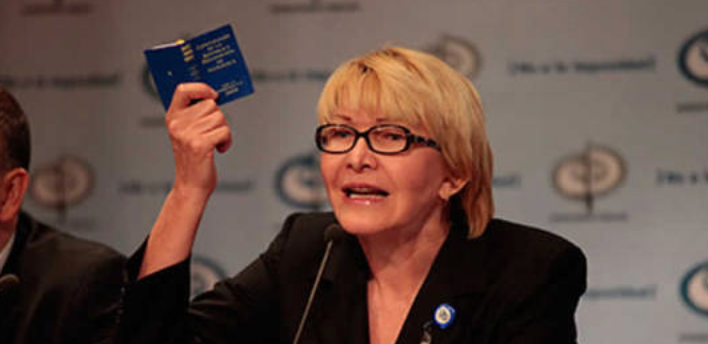Today, Venezuelan Attorney General Luisa Ortega is scheduled to face trial over allegations that she has committed “grave errors” in her role as the country’s top prosecuto. But it is not clear at this point if she will appear, who she will appear in front of, nor what exactly will take place.
Last night Ortega’s private lawyers filed a recusal of seventeen of the Supreme Court judges that were to sit on the trial. These judges were named in Ortega’s law suit demanding their removal for having been illegitimately named in December of 2015, which means their sitting on the trial would present a conflict of interest. Ortega’s lawyers suggest this recusal should be resolved before the hearing begins.
The hearing is set for 10:00 this morning by the Supreme Court (Tribunal Supremo de Justicia, TSJ), which took up charges first presented by Chavista lawmaker Pedro Carreño. The legislator has publicly questioned Ortega’s recent decisions, and even suggested that she may be showing “clear demonstrations of mental insanity.” In announcing the hearing date, the TSJ also announced that Ortega’s assets had been frozen and that she had been prohibited from leaving the country. While the charges against are administrative, not criminal, they could lead to her potential removal from office.
The move is the latest in a series of judicial attacks on the independence of the prosecutor in recent days. On June 27, the TSJ issued a decision granting criminal investigative authority to and broadening the authority of Human Rights Ombudsman (Defensor del Pueblo) Tarek William Sabb. The court also annulled Ortega’s April selection of Deputy Attorney General Rafael González Arias, who would replace Ortega in the event of her potential removal.
To many analysts, the decision is evidence of a clear attempt to isolate and remove Ortega, who has been increasingly critical of the government. From her highly public March 31 rebuke of the TSJ’s unconstitutional attempt to dissolve the National Assembly, her repeated criticism of the extreme use of force against protesters by the National Guard, her criticism of the use of military courts to process civilians, and her open rejection of the Maduro government’s effort to convene a National Constituent Assembly to rewrite the 1999 Constitution, Ortega has become a rare dissenting figure within the government.
Her stance has earned Ortega praise from a handful of Chavista moderates and a full embrace from the opposition Democratic Unity Roundtable (MUD) coalition, which previously criticized the attorney general for bringing charges against imprisoned opposition figure Leopoldo Lopez in relation to violence linked to the 2014 round of protests. Support for Ortega was evident on July 1, when the MUD organized a march in Caracas to reject the TSJ’s approval of the hearing against the attorney general.
Ortega’s criticism, and the government’s response, has also earned her international support. On June 13, a group of attorney generals from 10 Latin American countries—Argentina, Brazil, Chile, Colombia, Costa Rica, El Salvador, Guatemala, Panama, Paraguay and Uruguay—as well as Portugal and Spain issued a joint statement expressing “profound concern” over public attacks against Ortega. On June 30, the UN Special Rapporteur on the Independence of Judges and Lawyers also issued a statement in support of Ortega, and rejecting efforts to intimidate her.
The attorney general has continued to act upon abuses even in the face of this institutional battle. On June 29, her office subpoenaed Antonio José Benavides Torres, ex-commander of the National Guard, to appear on before the Attorney General’s office investigation into whether he was responsible for “grave and systemic human rights abuses” carried out in response to the recent wave of protests. Two days later, Maduro awarded Benavides Torres with a presidential medal. Her office also announced an investigation into SEBIN intelligence service director Gustavo González López on similar grounds.
This legal procedure should have meant that both Benavides Torres and González López would appear before investigators at the Attorney General’s office. However, yesterday the TSJ put a stay on the Attorney General’s subpoena of Benavides Torres. They also declared “extensive effects” of the sentence, meaning it would also cover González López who was subpoenaed for today, July 4.
Ortega has also taken steps to complicate efforts to erode the independence of her office. Following the TSJ ruling that gave powers of criminal investigation to the loyal Ombudsman, she immediately announced that she would not recognize the ruling, and called on Venezuelans to join her in invoking Article 333 of the Constitution, which allows for citizens to stand up for constitutional order in the event of its breakdown. She also requested that the National Assembly ratify Gonzalez as her deputy, so that he could take her place if she was removed. Although the legislature did so on July 3, the fact that the TSJ is holding the Assembly “in contempt” will likely mean that the court will ignore this—and Venezuelan judicial observers suggest it will probably name its own deputy attorney general to serve as Ortega’s replacement.
Also yesterday the Comptroller General Manuel Galindo, began an in depth review of the administrative and budget procedures of the Attorney General’s office from January 1, 2008 to June 30, 2017. Luisa Ortega has held this position since December 13, 2007. She was renewed for a seven year term in December 2014.



